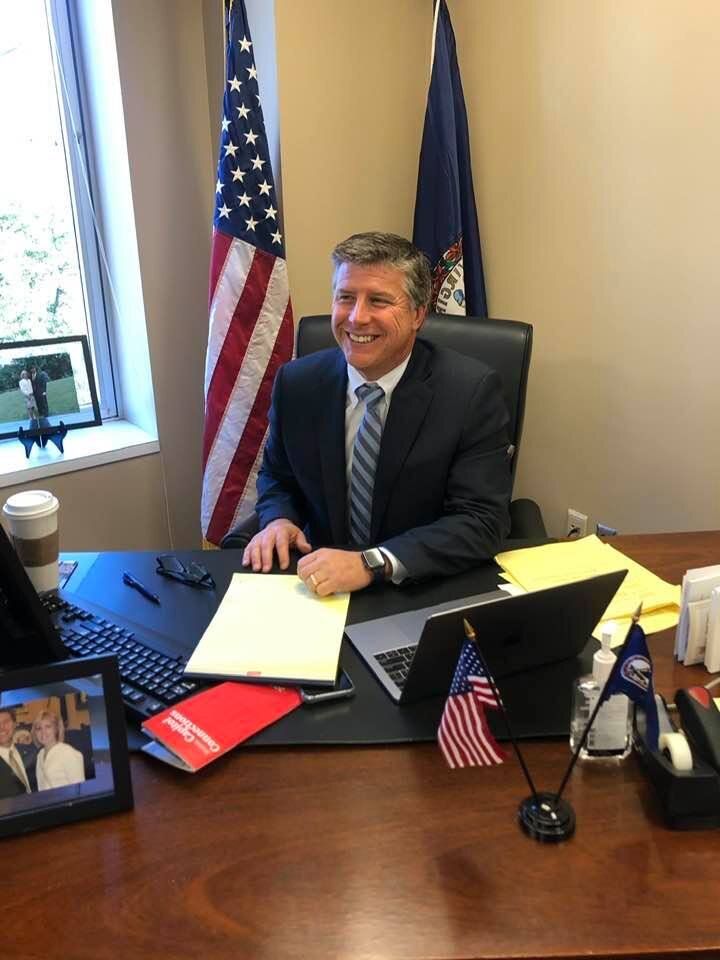The General Assembly returned to Richmond this week to complete the process of approving Virginia’s 2018-2020 Budget. The end result was a budget unlike any Virginia has ever enacted.
The Senate Finance Committee crafted and approved a balanced, conservative, and fiscally responsible budget. It included increased funding for our public schools and state-supported colleges and universities. It provided essential increases for public safety and health and mental health care, too. It even featured pay raises for public school teachers, state employees, and state-supported local employees like sheriff’s deputies.
The budget approved by the Senate Finance Committee made substantial deposits to the state’s Rainy Day Fund and set aside more for Cash Reserves, which will improve Virginia’s fiscal stability and help preserve our AAA bond rating.
The Senate Finance Committee’s budget plan met all these priorities without raising taxes.
Overall, the budget approved by the Committee would have increased spending by nearly 7% over the budget under which the Commonwealth is currently operating. In previous years, that would be considered a generous increase. But, a generous increase wasn’t enough for the Senate plan to win approval. Although most Republican senators voted in favor of the Senate Finance Committee’s plan, it was rejected by a majority of the Senate.
In a sign of just how far Virginia has moved away from its tradition of conservative fiscal management, the budget that was ultimately approved increased spending by more than 11%, the greatest growth in state government spending this century.
As has been widely reported, the approved budget includes Obamacare’s Medicaid scheme, making Virginia the first state to expand Obamacare since the 44th President left office over 16 months ago.
To cover the state’s portion of the expense of the expansion, a new $600 million tax on hospitals – twice what the Governor proposed during regular session – was included in the budget that was approved. Despite this new tax, calculations by the Senate Finance Committee staff indicate that Virginia’s for-profit hospitals will actually increase their bottom lines by $1 billion under the scheme. As with virtually all taxes, the expense will ultimately be borne by the consumer.
Fans of big government will love this budget. When you increase spending this much, there’s a lot to spread around. In radio and television ads, those who supported this budget have been busy touting all the “benefits” of higher government spending. From a bigger government to an ample supply of pork and earmarks, this budget undoubtedly has something for everyone. But, that spending is likely not sustainable beyond this budget.
Medicaid is already the fastest-growing expense of state government. In just 10 years, it has grown from 14% of Virginia’s general fund expenditures to 23%, where it is currently. Since the general fund also pays for core government services like schools and public safety, Medicaid is continuing to crowd out funding for those other services.
Other states that have expanded Medicaid are already experiencing this phenomenon. That’s one of the reasons why several states have had teacher strikes this year, as their legislatures learn that Obamacare’s promise of “free” money to expand Medicaid isn’t quite as free as they had hoped. In its efforts to rein-in federal spending, the Trump Administration has targeted funding for Medicaid expansion to be phased-out.
While this situation does not bode well for Virginia’s fiscal future, there are some immediate effects of this budget you’ll be experiencing later this year. The budget plan approved does nothing to reduce Obamacare’s high – and growing – health insurance premiums or its exorbitant deductibles and out-of-pocket expenses. Most consumers should brace themselves for another hefty hike later this year, fueled by Virginia’s decision to fully implement Obamacare.
Since Governor Northam vetoed Senate Republican legislation that would have given consumers more – and more affordable – health care options, Virginians will have to look to the federal government for relief from Obamacare’s costly, same-size-for-all health insurance policies. Of course, those $600 million in new taxes will have to be paid, too. That means there will be no relief from the cost of health care.
This is nowhere close to the result I wanted for Virginia, which is why I was among the 17 senators – all Republicans – who voted against this plan.
Although a budget was approved, the Special Session isn’t over yet. There are some judicial vacancies that still have to be filled. I’ll be back in the district until then.
